It's been a while since I logged on, due to acute travel fatigue, sickness, and lack of an internet connection -- but I must write about what happened on Friday. Horeb and I left Katanga on Thursday to travel to the eastern part of the Democratic Republic of the Congo -- specifically, North Kivu province.
A beautiful place of great lakes, mists clinging to rolling green hills, tea plantations, and chilly temperatures exists in sharp contrast to some of the worst violence against civilians in the world, especially women and children. Ongoing violence is perpetrated by several armed groups from Rwanda, Uganda and the Congo.
I wanted to get stories and footage on child soldiers, and to check up on some of our child protection work being done in the Beni area of North Kivu, so into the mix we flew, taking a long flight from Lubumbashi (four stops along the way) up to Goma, the main town in North Kivu that sits right on Lake Kivu, with a sweeping view of Rwanda on the other side of the lake.
But, how to get there?"Let's get a security update from MONUC." Horeb suggested this as we were waiting for our World Vision colleagues to pick us up from the airport. MONUC is the acronym for the United Nations Peace Keeping mission in the Congo, which is currently the largest UN peacekeeping deployment in the world.
"It may be better to drive than to fly, but let's also check on getting a plane reservation to Beni as well. It's good to have more than one choice in the Congo, Rory," he advised. "And you said when you first proposed this trip back in December that you would be flexible, so ... let's be flexible ...." Horeb made such suggestions with a broad smile.
"You keep throwing that word back in my face," I smiled in return. "But, no problem."
"You'll like the drive," Horeb assured me. "A beautiful view of the Congo River basin and the Nile River basin as you drive along, and many plateaus and views. It's amazing!"
"Wow. Sounds wonderful! Let's drive, Horeb! That's my choice! I'd much rather drive than fly!"
"Okay. But first let's check with MONUC on the security situation. And I want to pick the right driver for this mission and get a new vehicle to make sure it can handle the trip." I should have tuned in better to the fine print, but I was so excited to see Congo by road! I couldn't wait to take pictures and actually be a "tourist" in eastern Congo, for a change.
After the typical back-and-forth to many different offices and talking with a couple of different people at the MONUC-Goma compound, they said they would give us a military escort from Rutshuro up to Kanyabayonga. The commander said they had a convoy going in that direction anyway, so we could drive along with it. Great! One option in the bag.
We also did the requisite running around to see if we could get a flight from Goma to Beni, instead of driving, but that didn't quite work out, as there was only one seat available. So, we were forced to drive anyway. No problem -- I had already set my mind on driving.
But Horeb softly asked again while we were trying to negotiate a flight -- "Are you sure you want to drive? You can take the flight up and Christian should be in Beni by now, so he can take you."
"No," I responded enthusiastically, "let's just drive. You've got the contacts of the people we are meeting in Beni, so you should come. It's safe, right? And MONUC told us that security in that area has been good, so why not?"
"Okay. No problem. Let' make arrangements to get a good vehicle. Oh, and be sure and leave your computer in Goma as well as anything valuable, just in case."
"Sure thing. I told you I could be flexible, Horeb!" Silly me, I was still only thinking of taking pretty pictures of Congo by road ....
I thought Rutshuro was a section of Goma. Nope, it's actually a town unto itself, about two hours north of Goma. We left Goma at 6 a.m. to meet the MONUC convoy which was scheduled to leave Rutshuro at 8 a.m.
Faustin was our driver, an old schoolmate buddy of Horeb's, who is the head driver for World Vision's operations in Goma.
Another Rambo, Horeb called him. "He's gone with me on many dangerous missions, and has many contacts with the FARDC [Congolese Army]. He is the only one I'd take on such a mission."
And along the road there was a heavy military presence. About every quarter of a mile, you could see FARDC troops along the roadside. "Don't worry, Rory. This is a good sign, it means no rebel activity in the area."
Okay. But I do recall reading in many of the reports I read that the FARDC were among the worst perpetrators of rape. In the back of my mind I thought of the case of a European aid worker who was gang raped by troops in South Kivu; she committed suicide afterward.
"No problem, Horeb," I assured, masking my nervousness. "It's good to know we have security along the way."
The road was pretty good, mostly tarmac, and Faustin knew how to drive fast while dodging the potholes; we made it to the MONUC-Rutshuro compound by 7:30 a.m.
We pulled up to see a convoy going back south in the direction of Goma. Apparently the communications from MONUC-Goma to Rutshuro got mixed up. "Please have a seat and wait," said one of the Indian officers. "I think we can arrange something." We sat for awhile in the visitor waiting area, and then we were escorted to a canopied sitting area facing the officers mess hall.
Prattling on about GeorgeThe MONUC mission in North Kivu was mostly filled with troops from India. Although the compound was made of canvas tents, the area was quite nice, actually. They had planted grass and many flowers, and laid the area out quite nicely. We sat and waited and chatted with different officers, in hopes of securing some sort of escort along the way.
One handsome officer said to me, "We are quite busy. Some people from New York are here, so all of our vehicles are tied up. Please, would you like some tea?" Sure. It's rude to refuse, so we sat and drank lots of tea and chatted about everything ... from the weather, to Hinduism and Christianity, to finding meaning in life, to arranged marriages. A nice long conversation.
Around 9:30 a.m., we saw some people file in to the officers' mess hall -- "Must be the New York contingent," I said aloud, wondering how long we would have to wait until we got an escort and could be on our way. A few civilian white faces filed in along the walkway before us -- and then I did a doubletake -- I couldn't believe it! George Clooney was walking among them. My jaw dropped.
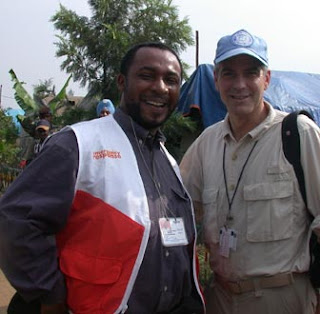
"That's George Clooney!" I said to Horeb. By then, the Indian officers went into the mess hall to facilitate the visitors from headquarters. Horeb, Faustin and I sat as we watched about 15 people file past into the mess hall.
"Oh my gosh, that was GEORGE CLOONEY! I can't believe it!"
"Who?" Horeb asked.
"I just saw George Clooney! What's HE doing here!?! Oh my gosh!"
"What?" Horeb asked again, wondering what I was prattling on about.
"He's a big film star in America. Even bigger than your favorite, Rambo!"
"No! Really?"
"Yes. I can't believe he's here!" I squealed. How weird. Waiting in the midst of hills, jungle, and possible danger; hoping for a military escort out of danger, and we see George Clooney file in, as comfortable and modest as if he was supposed to be there.
"Would you like to come in for breakfast?" asked one of the officers who had been chatting with us. "Sure!" I wasn't hungry, but I wasn't going to pass
this meal up.
We joined the line circling the table which had laid out boiled eggs, chapatis, chutney, naan bread, fried cheese, potato patties and meat sandwiches. There were plastic chairs arranged in a circle next to the table with food. As the honored guest, George Clooney was among the first to go around, and he took a seat on his own, rather shyly looking at his plate.
The officers were very kind to us, and let us go ahead of them. I quickly picked up a sandwich, chapati and some chutney and sat down about four chairs away from George. I picked at my food, and then I finally plucked up the nerve to sit in the empty chair next to him. Then something clicked and I went into my "Washington mode."
"So, what in the world brings George Clooney to Eastern Congo?" I started the conversation as I settled in beside him (just before one of his handlers could zoom in to try and take the seat).
"I'm just here checking things out," he responded, modestly, still looking at his plate, but with a shy smile. He was a pleasant, modest fellow. He is of rather small build, not much taller than I, but just as handsome in real life as he is onscreen. Same beautiful eyes.
At this point I could easily descend into drooling over episodes of ER and Oceans 13 and make a complete fool of myself. So, I had to put those out of my head.
"Where are you from?" he asked.
"Washington, D.C."
"That's rare, to find a native from D.C."
"Actually, not among African-Americans," I responded. "My family goes back about four generations in DC. And many Blacks have been in DC since the time of Fredrick Douglass."
"Right," he nodded in polite acknowledgement to my lecture. "But what brings you here to eastern Congo?" Mr. Clooney flipped my question back at me with a shy smile, never quite looking me in the eye.
"I work for World Vision, a relief and development agency that is doing work in the area. But I work in the DC office as a lobbyist, doing advocacy for those impacted by the conflict in the Congo. Everyone works the system in DC. I figure we ought to work the system to help the poor in the Congo, too."
"Hmm, interesting." We quipped a bit about the DC scene. Then I asked him for his impressions of the Congo. He recalled his trip to Darfur; he expressed more optimism and saw more potential in the Congo. I asked why he cared to come all, particularly because he did not have to. He briefly talked about his father ... as a TV journalist, his father covered a lot of the conflicts in Central America, making many efforts to try and get attention and action to those forgotten areas.
"I hope that by coming here we may get a bit more attention to the Congo." I smiled and nodded. "Yes, I'm sure your visit will. Thank you for coming. It is much needed."
Inside my head, I was screaming:
MOM, I MET, GEORGE CLOONEY!!!!!!Yes, girls, I met George Clooney and I even talked with him!
So what were my impressions of George Clooney? A pleasant, modest fellow. In this setting, he seemed taciturn, yet strong. He had a natural air of confidence which comes from traveling among those of influence.
In the midst of our conversation, I remembered to introduce Horeb to George Clooney: "This is my colleague, Horeb Bulambo. He also makes films and has made his own films on sexual violence in the east."
Horeb and George Clooney shook hands. "Hello, Mr. Clooney. I am a big fan of yours. We know you here in the Congo. If possible, I'd love to take a picture with you."
"Sure! No problem," he replied. At that moment, some announcements were made and thanks given. One of Mr. Clooney's UN handlers came by and asked that I keep the visit hush-hush, etc.
Sure thing (even though a BBC reporter was traveling with him)! No problem. I understood that he wanted to keep a low profile, etc.
"No problem. I understand. We were just here trying to get a military escort up to Kanyabayanga. And then you guys come. Looks like we'll have to wait on our escort."
"Yeah, must be surreal," his UN handler responded. Indeed. His handler asked for my business card, which I had left in our jeep, so I made my way back to the parking lot. By the time I got some cards, George Clooney and the group had migrated out of the mess hall and were making their way toward the parking lot. I passed my card to his handler, then found Horeb in the midst of the crowd. I plucked up my courage again, returned to "Washington-mode," and wedged my way up to Mr. Clooney again. I gave him my business card and wished him luck. "We are traveling up north in search of a 9 year-old child soldier who is reported to be a general in a child army," I said as I handed George Clooney my card.
"What?!?" he responded, with true incredulity.
"Yep," I replied. "I think we can get video of this, and I'd be glad to share it with you so that we can get more publicity about the tragedy of child soldiers in this area."
"A 9-year-old general?" He looked me dead in the eye this time (I almost fainted!). "Wow, good luck with your trip! Safe travels to you." He folded my card and put it in his pocket, then the crowd swallowed him. He paused briefly, turned around and pointed to Horeb -- "You! I promised I'd take a picture with you. Come, let's take a picture."
So, Horeb gave me his camera and I fumbled with it, not knowing how to use a digital camera; Horeb had to break out of his pose to show me where the shutter button was as Mr. Clooney and his crowd waited patiently for me.
I took the picture and then George Clooney and the crowd evaporated, and Horeb and I were left standing and watching as they disappeared with an escort out of the compound.
Surviving Virunga National ParkAfter George Clooney left, we waited about another two hours, intermittently making conversation with the Indian officers, drinking tea and eating biscuits, and twiddling our thumbs with increasing anxiety.
By 11 a.m., Faustin, our driver, was getting nervous. "It's getting late," Faustin said, in English, pointing to his watch. "We need to be out of the park and in Butembo before dark." I didn't quite understand the problem--it wasn't even noon, so how could it be late? Still, when your local staff get nervous, especially one known as "Rambo," I knew I needed to be concerned as well.
Horeb spoke to me in French so that the Indian officers would not hear his urgency and concern, asking that I play the fussy American and demand an escort. I cleared my throat, and with the biggest smile and the sweetest voice I could muster, I asked about our escort. "No problem, ma'am. We should be able to escort you guys to the bridge."
"No, to Kanaybayanga, we need you to go to Kanyabayanga," urged Horeb. There was a back and forth between Horeb and the Indian logistics officer. "No we can't spare any other vehicles, as they have all gone with the New York contingent. I've got two cars coming back in the next 20 minutes. They can escort you to the bridge. No problem, but only to the bridge."
Horeb and I both sighed. I thanked them. Horeb explained to Faustin in French that we would only get an escort about a fourth of the way. Faustin shook his head, got up and walked away, making some calls to his military friends on his cell phone.
"Well, that is the most dangerous part. Faustin will call his FARDC people and we should be okay through the park." We left Rutshuro at 11:30 a.m. with a military escort, one before our vehicle and another behind us. It was mostly a dirt road along the way to the bridge. Along the way we saw some Mai-Mai (local militia) standing guard, and a few FARDC troops, but mostly, we saw forest and savanna. We got to the bridge without incident, waved goodbye to the Indian officers, and then Faustin kicked up dust.

"Now, you need to sit in the back, Rory. I don't want the officers to disturb you." I crawled in the back, and we drove about 300 miles for the next eight hours along a relatively good road (by African standards), but still very bumpy all the same. We were entering Virunga National Park -- which used to be a major tourist attraction during the 1960s, with big game like what you would see in the Serengeti -- but now home to rebels and armed factions.
The road was long, and much of the way we saw many, many FARDC officers. "But I see many antelope," Horeb chirped. "See the antelope, Rory? That is a good sign. It means that the lions will come soon."
"And once the lions come, so will the people," I replied.
"Yes, in 10 years there will be no war here; instead, people. Tourists will come to see this beautiful land." Every time we passed a group of antelope, Horeb would point them out to me; and every time we passed a group of FARDC troops, Horeb would wave and smile and shout "thank you!" out of the vehicle as we sped along. They would wave back at us.
Faustin kept speeding along. About an hour after we parted from the MONUC escort, we came upon a truck piled high with soldiers and some sort of cargo, blocking part of the road. We were forced to stop. I could see many of the officers looking at me; some were pacing the road.
One of the officers came up to us and peered into the window. He eyed me in the back seat. He and Horeb had a few exchanges in the local Swahili. The officer looked back at me again and then walked along. Horeb lifted his hands and said "Merci!" The officer shook his head and Faustin slowly maneuvered our vehicle around the truck.
Once again we were speeding along the windy road. "What did you say to that guy, Horeb?" I asked.
"Nothing much. He asked me for money, but I said that I was with my boss [referring to me] and that I wouldn't approve."
"Oh," was all I could say.

We were stopped only one other time, but Faustin knew the commander at that point so we were fine. The road continued to snake upwards into the hills, past beautiful forests, military checkpoints, and even across the equator. I got my pictures and my views of both the Nile and Congo River basins.
Once we got to Kanaybayanga, the village-town up in the hills, beyond the point of danger, Horeb exhaled and exclaimed, "Rory, this drive was dangerous! Did you know that?!"
"No, I didn't. But you told me it was safe! And MONUC said it was ok."
"Rory, MONUC is not God. You must like danger," he smiled.
No, I definitely do not -- but I had a feeling we would make it through. Or maybe it was just blissful ignorance which enabled me to trust that we would be okay. And, by God's grace, we made it safely through Virunga National Park, once home to the big game ... and now to some of the most violent guerillas in the world.
Posted by Larry Short on behalf of Rory Anderson in the Congo.
 On Tuesday, February 26, a wave of neon green shirts descended on Capitol Hill. More than 700 representatives visited their states' senators and state representatives to advocate in the Lobby Days for Northern Uganda.
On Tuesday, February 26, a wave of neon green shirts descended on Capitol Hill. More than 700 representatives visited their states' senators and state representatives to advocate in the Lobby Days for Northern Uganda.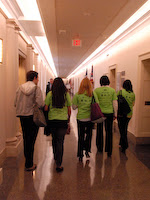 Then the teams were off. The gray skies and drizzle outside only served to make their green shirts more vibrant and noticeable. People in the halls of the Senate office building stopped team members to ask about their cause.
Then the teams were off. The gray skies and drizzle outside only served to make their green shirts more vibrant and noticeable. People in the halls of the Senate office building stopped team members to ask about their cause. Jessy said she knows a lot about the crisis in Darfur, but first learned about Uganda by watching the movie Invisible Children in a social work class at Colorado State University. Jessy seeks to raise awareness with her clothing and bag line called "Who Cares." The bags and clothing carry attention-grabbing phrases that provide a jumping-off point to start a conversation. She then donates half the net profits to causes.
Jessy said she knows a lot about the crisis in Darfur, but first learned about Uganda by watching the movie Invisible Children in a social work class at Colorado State University. Jessy seeks to raise awareness with her clothing and bag line called "Who Cares." The bags and clothing carry attention-grabbing phrases that provide a jumping-off point to start a conversation. She then donates half the net profits to causes.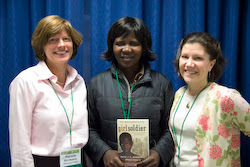 "I wish more people could see how active the youth are," she continued. "We get a lot of bad news about youth in the news. You don't hear so much about the positive."
"I wish more people could see how active the youth are," she continued. "We get a lot of bad news about youth in the news. You don't hear so much about the positive." The success of the Lobby Days can be seen on multiple levels. The event reached out to people across the generations. People feel more knowledgeable about the crisis now. The prospect of being advocates and lobbyists for their cause is not quite so intimidating anymore. "I'm definitely going to write follow-up letters," said Jake, from Ohio.
The success of the Lobby Days can be seen on multiple levels. The event reached out to people across the generations. People feel more knowledgeable about the crisis now. The prospect of being advocates and lobbyists for their cause is not quite so intimidating anymore. "I'm definitely going to write follow-up letters," said Jake, from Ohio. Posted by Larry Short on behalf of Laura Reinhardt in Washington D.C. Laura is Assignment Editor for World Vision in the United States and has just completed her coverage of Lobby Days for Northern Uganda.
Posted by Larry Short on behalf of Laura Reinhardt in Washington D.C. Laura is Assignment Editor for World Vision in the United States and has just completed her coverage of Lobby Days for Northern Uganda.



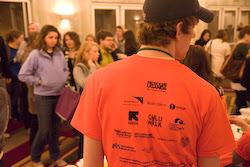








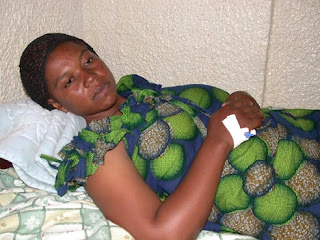

 "Now, you need to sit in the back, Rory. I don't want the officers to disturb you." I crawled in the back, and we drove about 300 miles for the next eight hours along a relatively good road (by African standards), but still very bumpy all the same. We were entering Virunga National Park -- which used to be a major tourist attraction during the 1960s, with big game like what you would see in the Serengeti -- but now home to rebels and armed factions.
"Now, you need to sit in the back, Rory. I don't want the officers to disturb you." I crawled in the back, and we drove about 300 miles for the next eight hours along a relatively good road (by African standards), but still very bumpy all the same. We were entering Virunga National Park -- which used to be a major tourist attraction during the 1960s, with big game like what you would see in the Serengeti -- but now home to rebels and armed factions.